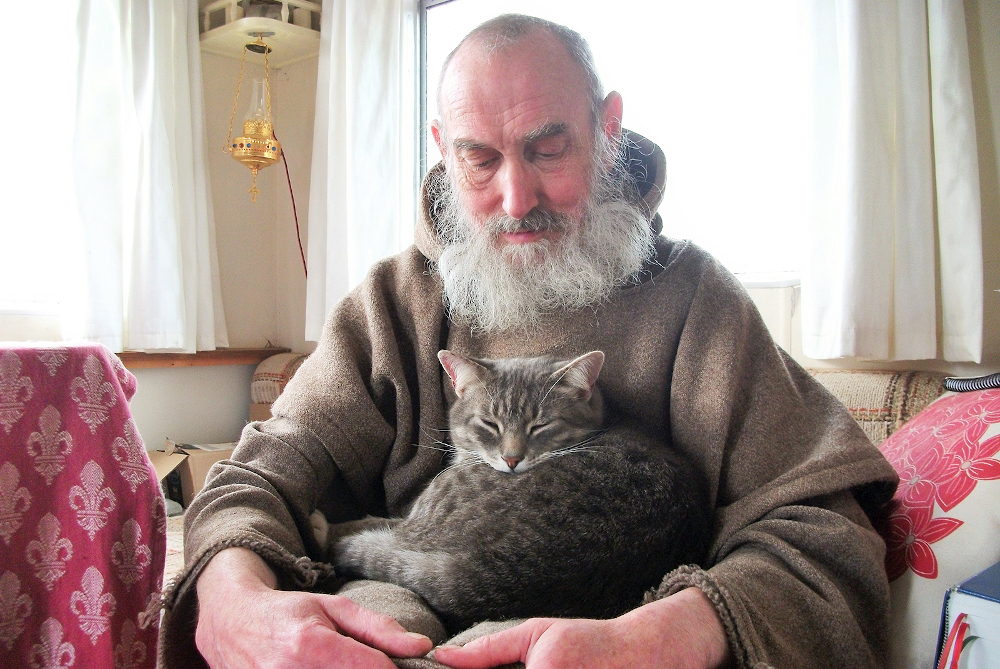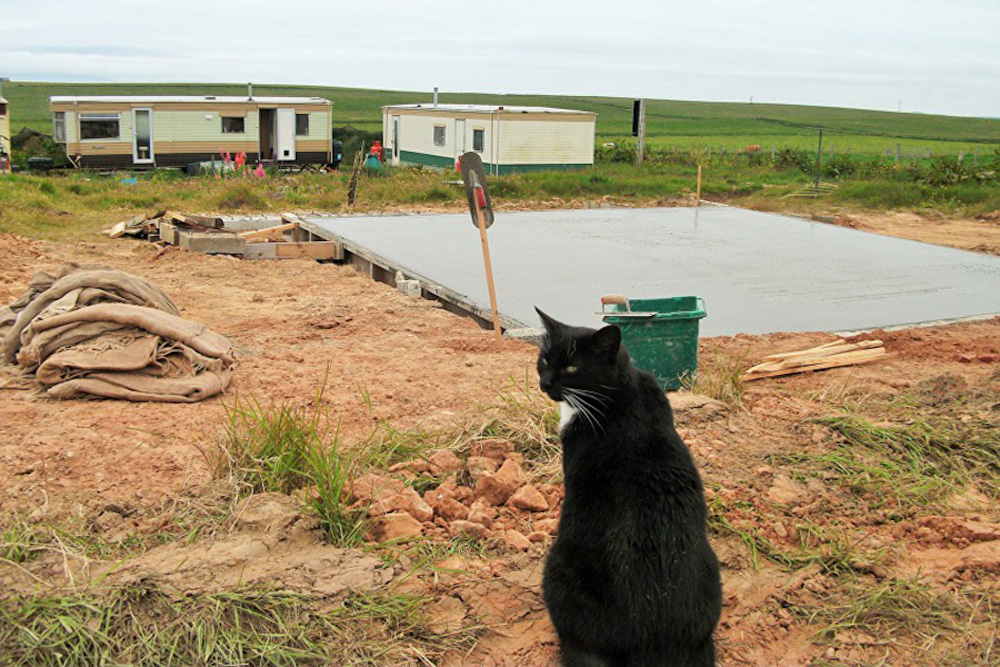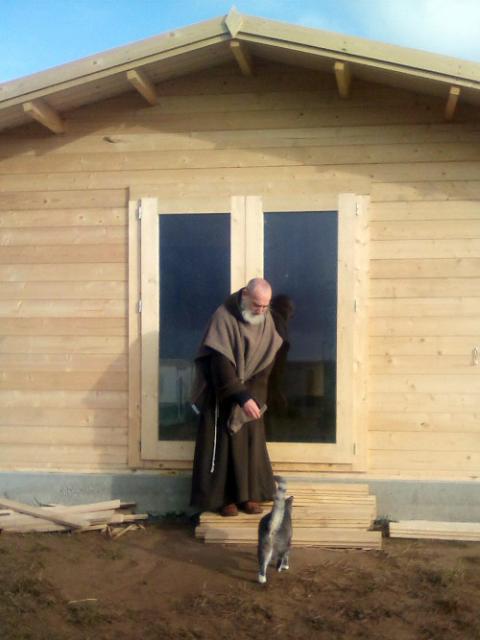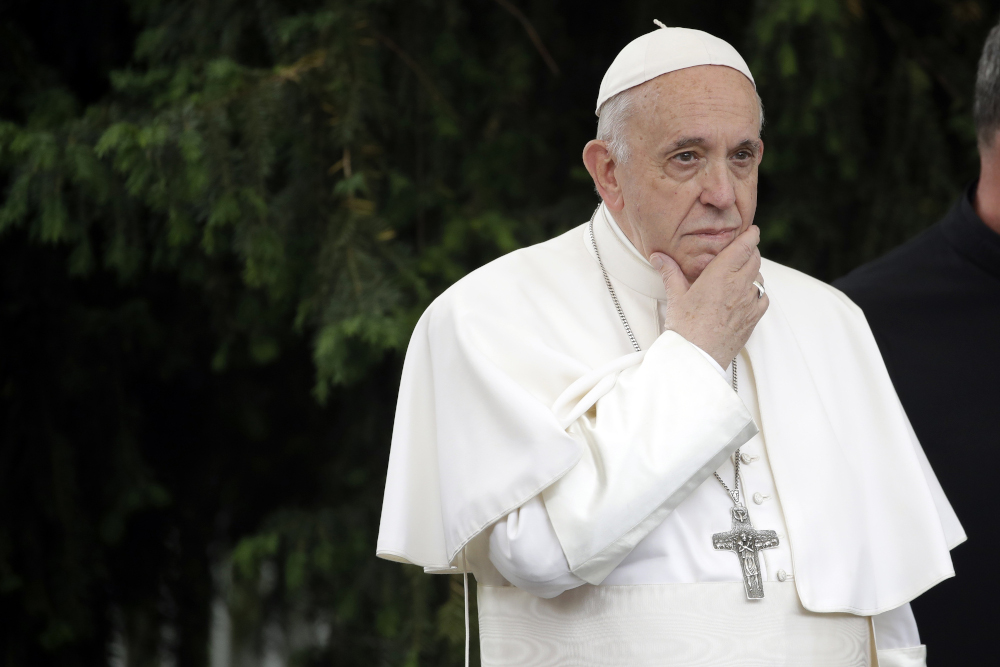
Hermit monk Stephen De Kerdrel sits with one of his cats on the island of Westray in Scotland. (Courtesy photo)
Stephen De Kerdrel, a hermit monk who was recently excommunicated by the Catholic Church, didn't like Pope Francis right off the bat.
While watching the pontiff on TV as he emerged for the first time in 2013 before faithful gathered in St. Peter's Square, De Kerdrel took a good look at the pope's clothes — simple and unadorned — and knew, he said, that something was "terribly, terribly wrong."
Francis' decision not to wear the mozzetta, the red velvet and fur lined cape reserved for popes, was for De Kerdrel the initial indication that this pontificate was going to break with tradition. As the Argentine pope's pontificate progressed, it became clear to De Kerdrel that the Catholic Church was opening its doors to the world in an unprecedented way.
But from the remote Orkney island of Westray in the far north of Scotland where he lives, De Kerdrel and his two companions — fellow monk Damon Kelly and Sister Colette Roberts — were not seeking to build bridges with the world.
Instead, the trio was trying to escape from it.
Day after day, that world evolved further away from their beliefs, casting the three out to places that (despite their isolation), in today's interconnected reality filtered through sectarian news outlets, were never remote enough.
Just before Christmas, the three hermits were excommunicated by the Roman Catholic Church for denouncing Francis and most of the Roman Catholic Church's hierarchy as being in league with Satan.
"We have broken from a false pope, a false magisterium, at the moment, and a false Curia and false bishops and cardinals," De Kerdrel told Religion News Service in a mid-January phone interview.
"We've broken with them; we've not broken with the church. The church is there, but it's under all this mess," he said.

A variety of cats live with the monks on the island of Westray in Scotland. (Courtesy photo)
Excommunication is the latest step in a long journey by the three companions who, for years, have tried to cut themselves off from the sins of the world, as they see it, so they can live closer to God.
It's a journey that took them from the Midlands of England to the remote islands of Scotland. They have been living there as hermits since 2016, with a handful of cats, in a pair of run-down homes with no running water. They have just enough electricity from solar power to run their blog and help them manage during the half of the year when sunlight is scarce.
The journey began 21 years ago this April, when both Kelly, now 58, and De Kerdrel, now 67, left the Capuchins, a Catholic religious order, to become hermits. While it's hard to believe today that some still choose a hermetic lifestyle, the practice continues to exist in the Catholic tradition, as well as in many other religions.
Traditionally desert-dwellers who trace their origins to the prophet Elijah, Christian hermits choose to seclude themselves from the comforts and distractions of interacting with fellow humans to devote their lives to prayer, and sometimes penance, in order to support the world with their intentions.
Throughout history, hermits have enriched the Catholic tradition with some of its holiest and most intellectual minds, including St. Jerome and St. Basil, whose contributions to Catholic thinking and theology have led them to be considered "doctors of the church."
Advertisement
Though beards, fasting and vows of silence are still a mark of hermits today, not everyone leading a hermetic life is isolated from the world. Mario Aguilar, a Benedictine hermit originally from Chile who also lives in Scotland, is a professor of divinity at the University of St. Andrews and is an active Twitter user.
"You have to look at the complexity of the different kinds of contemplative lives," he told RNS in a phone interview Feb. 7, adding that there are as many types of hermits as there are priests and lay people. Today, he added, a growing number of lay people have been attracted to this lifestyle, including himself.
"In secular terms, the hermit is somebody spending more time in solitude rather than in a community for the purpose of finding God," he said.
Aguilar's book, The Way of the Hermit, details his life as an eremite and activist, sleeping on the floor, providing his own food, occasionally listening to the BBC or praying for the victims of the coronavirus. He invites Buddhist and Hindu hermits to retreats and wrote a biography of Francis, whose work he follows with passion.
"The eremitic vocation is to see God, but not in a selfish manner," he said, adding that "you have to be a terrible hermit to start worrying and start blogging."
But the three hermits in Orkney, according to Aguilar, may have been disenchanted with the world already, choosing to initiate a "Catholic revival" not unlike the Celtic monks who arrived on the island as early as the 4th century.

Stephen De Kerdrel on the island of Westray in Scotland. (Courtesy photo)
"It has been an odyssey like no other," De Kerdrel said.
For years, the hermits moved from one island to another, never being able to find a place where they were welcome or didn't get into trouble.
At first, the hermits were set up in a hut in the Galloway Hills in Scotland with a small wooden chapel and a garden. They were then separated, with De Kerdrel going to the jagged coasts of the Isle of Mull and Kelly to administer to youth not too far away.
Once reunited, Kelly and De Kerdrel were joined by Roberts, now 64, in 2004 after she left behind her job as a consultant surgeon in the U.K. Before that she had been taking care of her chronically ill mother, who died in 2002.
De Kerdrel described her as "an anchorite nun," referring to the women who would traditionally live in small homes attached to the church and care for its needs.
The hermits' real troubles began after the July 2013 passage of a bill by the British Parliament legalizing same-sex marriages, which are considered "intrinsically disordered" unions by the Roman Catholic Church. That decision prompted Kelly to aggressively protest against homosexuality — including passing out leaflets that police have described as "homophobic" and telling a lesbian couple that the Catholic Church " used to burn people like you," according to news reports.
Eventually Kelly was arrested 13 times, convicted five times and spent about 148 hours in prison cells, said De Kerdrel. Kelly's public distaste and aggressiveness toward same-sex couples led the bishop of the Diocese of Northampton, in England, to ask the hermits to leave.
It wasn't just Kelly who got in trouble in Northampton.
De Kerdrel also was angered by the recognition of same-sex couples. A young friar he mentored named John Coffey became among the first gay men to get married when same-sex marriage was legalized in the U.K., and the hermit took it as a personal affront.
He also said that a woman accused him before the local bishop of "wanting to have his wicked way with her," a charge he vehemently denied along with other accusations of inappropriate behavior.
"When they are attacking you left, right and center, we come through it, we are still going! We're still together and we haven't gone insane!"
— Stephen De Kerdel
Later, in the Scottish town of Campbeltown, a woman alleged to the local diocese that De Kerdrel and Roberts were having an affair, a claim the hermit dismissed — saying the allegation was the result of having over 20 distilleries in the roughly 6,000-soul town.
He said that the trio resisted numerous efforts by bishops to separate them.
"People always wanted to break us up!" said De Kerdrel in a strong English accent that had a singsong quality even over the heavily disrupted phone lines on the island of Westray.
"When they are attacking you left, right and center, we come through it, we are still going!" he said. "We're still together and we haven't gone insane!"
De Kerdrel said that he hails from a "rather bohemian" background and that his brother was gay and died of AIDS. He revealed that before becoming a Capuchin monk, he had taken an interest in opera singing.
"I wanted really to do the big Wagner roles, but I have a talent for comedy, and I don't think that would have worked well with Rossini," he quipped.
The hermits, who started blogging in 2012, later began to rail against homosexuality, gay marriage and evolution on their blog. When local bishops told them to shut down the online pulpit, the hermits ignored them.
Francis was a frequent target of their writings, as his words and actions seemingly clashed with traditional Catholic positions.
From the beginning, the hermits were skeptical of Francis for being what they considered "a maverick, an eccentric," De Kerdrel said.
"But when we had the thing with 'who am I to judge?' things got serious," said De Kerdrel, referring to Francis' famed comment about homosexuality while talking to journalists on the way back from his first foreign papal trip to Brazil in 2013.
All of the steps that have led to making Francis popular among the masses, and especially among non-Catholics, were the things that drove the hermits away.

Pope Francis attends an ecumenical and interreligious meeting with young people in Skopje, North Macedonia, on May 7, 2019. (AP/Alessandra Tarantino)
"The awful truth began to dawn on us," De Kerdrel said, taking his cue from books such as The Dictator Pope by French historian H.J.A. Sire.
Sire and De Kerdrel studied at the same high school, which was run by the Jesuit order, to which Francis also belongs.
"The Jesuits always want things to be done one way," he said, "and the consequence would be catastrophic!"
The hermits watched in horror as Francis overhauled female religious life, focusing on prayer, formation and streamlining their many disparate communities around the world.
In 2019, when Francis encouraged interreligious dialogue and said that God has willed the religious diversity of the world, De Kerdrel said his reaction was "enough is enough."
He recalled walking to a rundown chapel near the hermits' home, sitting down next to the altar with one of the cats nestled upon his lap and writing the declaration that would eventually lead to excommunication.
"It was like the Holy Spirit. I swear it wasn't the devil!" he said, adding that the words just flowed out naturally. "We were so appalled by the bishops' in the church lack of courage. They are meant to protect the flock. They are meant to care for them."
In a blog post titled "With Great Grief," De Kerdrel explained the motives that drove the hermits to make the decision of officially severing ties with the Catholic Church.
"Pope Francis, by his utterances, his behavior, his teaching and his actions has shown himself to be indeed a great heretic," the post read.
Bishop Brian McGee of the Diocese of Argyll and the Isles, which oversees the small hermitic community, had warned De Kerdrel and his company of the penalties that his declaration would entail.
A spokesman for the diocese told the BBC that the local bishops, including Bishop Hugh Gilbert of Aberdeen, Scotland, made "several offers of dialogue, all of which were refused."
McGee offered to send a priest to the community to help the trio deal with what he believed was a bereavement born from the growing sexual abuse crisis in the Catholic Church.
"We're not impressive, you know. This is one thing we can do, and that is standing up to the truth."
— Stephen De Kerdel
The hermits said the abuse crisis had nothing to do with their decision.
"The destruction of the faith! That's the problem," De Kerdrel said.
He described himself and Roberts as "good old-fashioned Catholics, loyal, traditional." Kelly grew up in the Protestant tradition, and "he's still got a lot of Lutheran in him," De Kerdrel said.
"We're not impressive, you know," he said. "This is one thing we can do, and that is standing up to the truth."
Choosing excommunication is no small thing for such die-hard Catholics. Though seldom applied, this practice bars those affected from receiving or administering the sacraments, including confession and Communion.
Excommunication is not meant to be understood as a punishment and can be revoked by the pope or a bishop if the person who committed the offense makes a declaration of repentance and a renewal of obedience.
On Christmas Eve, the hermits got their wish.
A postal worker carrying the official excommunication papers came to their home in Orkney, mostly home to Baptists and lapsed Catholic Polish workers.
Excommunication so far has been a joy for the hermits.
Since the news broke, they have received "mountains and mountains" of correspondence from an online community that identifies with their concern and beliefs and thanks them for taking a stand. They also received financial help to fix up their caravans, which are in need of repair.
"Blow me down! The money is pouring in. I can't believe what's happening," De Kerdrel said, adding that they "certainly need it."
In the wind-swept desolation of the Northern Scottish Isles, now improved by a newfound internet community and animated by their beloved colony of cats, the hermits plan to grow their garden in the isolation that they so desperately sought.






